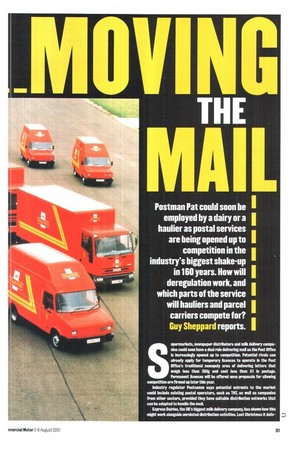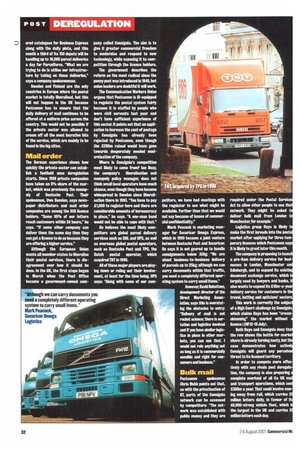S upermarkets, newspaper distributors and milk delivery companies could soon have
Page 31

Page 32

If you've noticed an error in this article please click here to report it so we can fix it.
a dual role delivering mail as the Post Office is increasingly opened up to competition. Potential rivals can already apply for temporary licences to operate in the Post Offices traditional monopoly area of delivering letters that weigh less than 360g and cost less than £1 in postage. Permanent Kcences will be offered once proposals for allowing competition are firmed up later this year.
Industry regulator Postcomm says potential entrants to the market could include existing postal operators, such as TNT, as well as companies from other sectors, provided they have suitable distribution networks that can be adapted to handle the mail.
Express Dairies, the UK's biggest milk delivery company, has shown how this might work alongside unrelated distribution activities. Last Christmas it deliv ered catalogues for Business Express along with the daily pinta, and this month a third of its 150 depots will be handling up to 10,000 parcel deliveries a day for Parcelforce. "What we are trying to do is utilise our infrastructure by taking on these deliveries,'' says a company spokeswoman.
Sweden and Finland are the only countries in Europe where the postal market is totally liberalised, but this will not happen in the UK because Postcomm has to ensure that the daily delivery of mail continues to be offered at a uniform price across the country. This would not be possible if the private sector was allowed to cream off all the most lucrative bits of the service, which are mainly to be found in the big cities.
Mail order
The German experience shows how quickly the private sector can establish a foothold once deregulation starts. Since 1998 private companies have taken an 8% share of the market, which was previously the monopoly of Deutsche Post. Their spokesman, Uwe Bensien, says newspaper distributors and mail order companies are among the 850 licence holders. "Some 95% of our letters reach customers within 24 hours," he says. "If some other company can deliver them the same day then they can get a licence to do so because they are offering a higher service."
Although the European Union wants all member states to liberalise their postal services, there is disagreement over how it should be done. In the UK, the first steps began in March when the Pest Office became a government-owned COM
pany called Consignia. The aim is to give it greater commercial freedom to modernise and respond to new technology, while exposing it to competition through the licence holders.
The government describes the reform as the most radical since the penny post was introduced in 1840, but union leaders are doubtful it will work.
The Communication Workers Union argues that Postcomm is ill-equipped to regulate the postal system fairly because it is staffed by people who were civil servants last year and don't have sufficient experience of this sector. It points out that an application to increase the cost of postage by Consignia has already been rejected by Postcomm, even though the £280m raised would have gone towards desperately needed modernisation of the company.
Where is Consignia's competition most likely to come from Ian Reay, the company's liberalisation and monopoly policy manager, does not think small local operators have much chance, even though they have become widespread in Sweden since liberalisation there in 1993. You have to pay £1,000 to register here and there are considerable amounts of bureaucracy in place," he says. "A one-man band would not be able to cope with that."
He believes the most likely competitors are global parcel delivery services such as DHL and UPS, as well as overseas global postal operators, such as Deutsche Post and 1PG, the Dutch postal operator, which acquired TNT in 1996.
All of these major players are playing down or ruling out their involvement, at least for the time being. UPS says: "Along with some of our com
petiters, we have had meetings with the regulator to see what might be available. Further than that we would not say because of issues of commercial confidentiality."
Mark Peacock is marketing man ager for Securicar Omega Express, which in 1999 became a joint venture between Deutsche Post and Securicor.
He says it is not geared up to handle consignments below 350g; "We are about business-to-business delivery of parcels up to 25kt although we can carry documents within that traffic, you need a completely different oper ating system to carry small Item" However; David Robottom, development director of the Direct Marketing Association, says ttis is overstating the obstacles to entry: "Delivery of mail is not rocket science; there is sortation and logistics nvohred and if you have simiar logistics in place in other markets, you can use that. I would not rule anything out as long as it is commercially sensible and right for cansumers and business."
Bulk mail
Postcomm spokesman Chris Webb points out that, as with the privatisation of BT, parts of the Consignia network can be accessed by competitors: "The network was established with public money and they are required under the Postal Servic Act to allow other people to use tha network. They might be asked t deliver bulk mail from London t Manchester, for example."
Logistics group Hays is likely t make the first inroads into the pasta market after applying for three tern porary licences which Postcomm say It is likely to grant later this month.
The company is proposing to lau a pre-8am delivery service for busi nesses in London, Manchester an Edinburgh, and to expand its existin document exchange service, which i largely used by lawyers and banks. I also wants to expand its £10m-a-yea delivery service for customers in th travel, betting and opticians' secto This work Is currently the subjec of a High Court challenge by Consigni which claims Hays has been "cream skimming" the market without licence (CM12-18 July).
Both Hays and Consignia deny tha the row shows the battle for marke share is already turning nasty, but th case demonstrates haw active! Consignia will guard any perceive threat to its licensed territory.
In order to compete more effec tively with any rivals past deregula tian, the company is also preparing complete overhaul of all its UK mai and transport operations, which cos £300m a year. That could involve mar ing away from rail, which carries 2 million letters daily, in favour of 40,000-strong vehicle fleet, which i the largest in the UK and carries 5 million letters each day.




















































































































